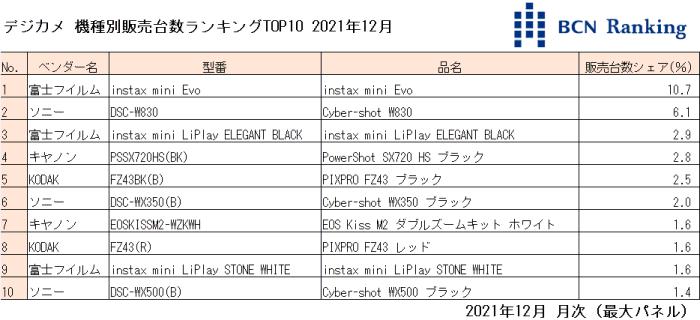New data released by major Japanese analysis firm BCN+R shows that Fujifilm saw massive growth in market share in December 2021 thanks to the wild success of the Instax Mini Evo. It was so popular, Fujifilm surpassed Sony in overall market share.
The Instax Mini Evo’s Popularity
Announced in November and released in December in Japan (it is expected to be widely available in the United States in February), the Instax Mini Evo is Fujifilm’s latest digital and analog hybrid that offers a digital capture experience with a built-in printer that can work with both photos captured with the Mini Evo and those imported from a mobile device.

The camera features a 28mm f/2 lens in front of a small digital sensor and comes with 10 integrated lens effect modes. The Mini Evo can print on a variety of different instant films, including a new one launched with the camera that has a white border.
One of the more enticing aspects of the camera is that it’s not particularly expensive at just $200. WhilePetaPixel’s Ryan Mense was not particularly enthused with the camera in his review, clearly his opinion is in stark contrast to what consumers in Japan are looking for. It has been pretty obvious that the Japanese camera market is very different from that of the west even outside this individual camera.
Fujifilm sold a huge number of Instax Mini Evo cameras in December, with a massive 10.7% of all camera units sold by model at BCN+R that month. To put that in perspective, the second place camera (a Sony Cyber-Shot W830), commanded 6.1% of all units sold while the third-place camera held only 2.9%.
Fujifilm Leapfrogs Sony into Second Place
BCN+R’s data shows that Fujifilm surpassed Sony in December and moved into second place overall in sales by brand in the country for the first time in years.
The analysis firm says that the compact camera type accounts for about 70% to 80% of sales volume of Fujifilm cameras by type, and while manufacturers are generally reducing the number of compact digital cameras they produce, Fujifilm is expanding its market share through a segment many thought to have all but dried up.
Obviously, Fujifilm is approaching the compact camera market differently than its competitors. Rather than focus on fully digital cameras, Fujifilm produces a range of film-based products or hybrid film and digital cameras that appeal to the resurgence of the analog medium. The Evo Mini is clearly a perfect hybrid of film and digital and offers the benefits of smartphone connectivity with the instant gratification of an instant print.
Fujifilm’s massive leap from its recent historical place of between third and fourth place in Japan might not last beyond December, but it does go to show that one inexpensive, pop-culture-driven product can have the power to dramatically alter a company’s fortunes in a particular market.
